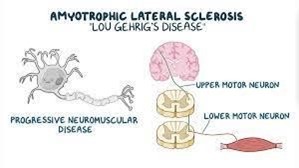A nurse is teaching a client who has amyotrophic lateral sclerosis (ALS) about the end stages of the disease process. Which of the following information should the nurse include in the teaching?
"You might wear splints over affected joints while you are sleeping."
"You will be given dexamethasone to treat muscle atrophy."
"You might require a machine to keep your airway open.
"You will receive nutrition through a central venous access device.
The Correct Answer is C
Choice A rationale:
Wearing splints over affected joints while sleeping is a strategy to prevent contractures, which are common in ALS.
Choice B rationale:
Dexamethasone is not used to treat muscle atrophy in ALS.
Choice C rationale:
As ALS progresses, clients may lose the ability to control their respiratory muscles, and a machine such as a ventilator may be required to assist with breathing.
Choice D rationale:
Nutrition through a central venous access device is not a standard intervention for ALS, as the focus is on preserving the client's ability to eat and swallow for as long as possible.

Nursing Test Bank
Naxlex Comprehensive Predictor Exams
Related Questions
Correct Answer is C
Explanation
Choice A rationale:
Placing the newborn under a radiant warmer is not directly related to addressing breastfeeding-related jaundice.
Choice B rationale:
Supplementing breastfeeding with formula is not the first-line approach and may interfere with establishing successful breastfeeding.
Choice C rationale:
Breastfeeding-related jaundice can occur if the newborn is not effectively breastfeeding and not getting enough milk. Assessing the effectiveness of breastfeeding is important to address the underlying cause of jaundice.
Choice D rationale:
Administering Rho(D) immune globulin is unrelated to addressing jaundice in a breastfed newborn.
Correct Answer is D
Explanation
Choice A rationale:
Sildenafil is typically taken as needed, not twice per day.
Choice B rationale:
Constipation is not a common adverse effect of sildenafil.
Choice C rationale:
Changing positions slowly after taking the medication is not related to sildenafil's mechanism of action.
Choice D rationale:
Sildenafil is a medication used to treat erectile dysfunction. Temporary visual changes, often described as a blue-green tinge or increased light sensitivity, are potential side effects of sildenafil due to its effect on the retinal enzyme.
Whether you are a student looking to ace your exams or a practicing nurse seeking to enhance your expertise , our nursing education contents will empower you with the confidence and competence to make a difference in the lives of patients and become a respected leader in the healthcare field.
Visit Naxlex, invest in your future and unlock endless possibilities with our unparalleled nursing education contents today
Report Wrong Answer on the Current Question
Do you disagree with the answer? If yes, what is your expected answer? Explain.
Kindly be descriptive with the issue you are facing.
